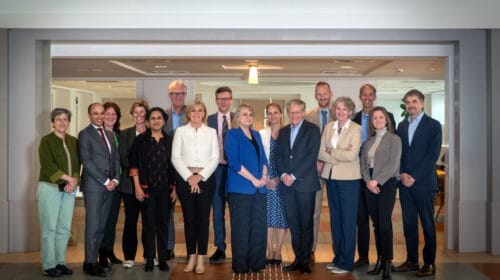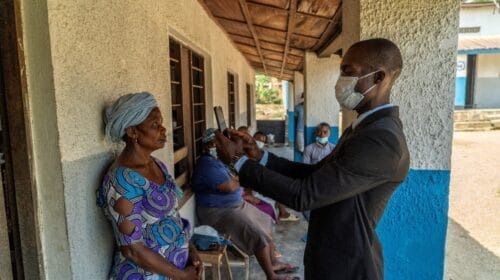Empowering the Nigerian youth

By 7 p.m. in a typical Nigerian city, you could catch young people doing at least one of these: working the smartphones for posts on social media, abusing drugs, listening to music, taking alcoholic drinks, advertising half-nakedness in the streets, and dating an opposite sex. Earlier in the day, however, you could observe some of them engaging in cyber fraud, gambling or trading in cryptocurrencies. And most of them, I bet, would look unhappy, malnourished, unkempt and poverty-stricken.
What has been described should evoke fear in every society. As supported by official statistics, a majority of about 100 million Nigerian youth (age 18-35years) are either jobless or underemployed. What is more, the situation has continued to worsen every day.
Growing poverty and unemployment should cause everyone within and outside government sleepless nights. Rather than call them “lazy”, we the older people ought to pity them and work to halt an emerging catastrophe capable of annihilating all of us. But it’s not true, as erudite Professor Anya O. Anya states in a recent interview with The Niche that “nobody in government is talking about these problems” and that “we have not started planning for the Nigeria that can solve the problem of poverty”. Every federal administration in the past 34 years, including the current Buhari administration, has had a programme or two aimed at tackling poverty and youth unemployment. What may become contestable is the quality of the programmes and their drivers’ productivity, sincerity and commitment.
There’s no denying the impact of the National Social Investment Programmes (NSIP), especially the N-Power component aimed at providing the youth with learning opportunities, job experience and stipends. NSIP was under the supervision of the Vice President’s office until the creation of the Ministry of Humanitarian Affairs, Disaster Management and Social Development less than two years ago. While some elements of NSIP (such as the Home-grown School Feeding Programme and Government Enterprise and Entrepreneurship Programme, under which Tradermoni, Marketmoni and Farmermoni and the Conditional Cash Transfer are captured) entail doling out raw cash to the “poorest of the poor”, N-Power at least seeks to temper youth unemployment.
Those who chose the name “N-Power”, I guess, wanted something that sounds like “empower”. The youth deserve to be truly empowered. And I speak to the younger generation, which appears to be facing frustration, even greater than what my generation has endured. As irregularly as it appears, my writing now pays more attention to development issues. Why? After shouting myself hoarse for over 30 years in journalism – over bad governance, incompetence, insincerity and corruption in government – I’ve decided to help those who lead us to lead better.
What urgently needs to be done is to reposition the youth to bring out the values this country needs in order to develop. What are these values? A mindset that recognises the value of honesty, hard work and healthy competition. A clear direction and encouragement for the youth. The environment here is toxic to business, prompting those who could to flee the country. A conducive environment necessary for businesses to thrive has become imperative, and this involves: the provision of power, roads, water and other infrastructure.
During a recent briefing, the Minister of Humanitarian Affairs, Disaster Management and Social Development, Mrs Sadiya Farouq was optimistic about meeting the president’s target of lifting 100 million Nigerians out of poverty in 10 years, “especially through innovative youth empowerment and gainful employment”. Of particular interest is N-Power, which has been the most popular, apparently because the beneficiaries are young graduates. The Minister said 540,000 applicants had been shortlisted for the Batch C programme; 500,000 will make the final list; and the second batch of another 500,000 will subsequently be prepared in line with President Buhari’s directive to engage 1,000,000 beneficiaries under the Batch C.
With over a million N-Power beneficiaries so far, there’s a need to refocus the programme so that the youth won’t have to return to the jobs market after enjoying a N30,000 stipend each month for two years. They should be helped to become self-reliant, for schools have failed to prepare them adequately. Rather than give them fish, we should teach them how to fish! And this can happen if the inistry and NSIP directors support us entrepreneurs to point them toward the right direction.
N-Power was designed to last just two years for each beneficiary. I’ve learnt, however, that it will henceforth be limited to one year, and an exit plan is being arranged for them by the Central Bank. That’s a better way to go, considering that fewer than a quarter of the number of beneficiaries do set up shop after two years. Minister Farouq revealed last year that out of 500,000 youth (in two batches) who benefitted from N-Power from 2016, only 109,823 went ahead to set up businesses in their communities. Over five million were registered for Batch C last year, which suggests that many want the programme to last forever as a social welfare benefit. It is understandable: better jobs are nowhere for them to pick, so they should receive an allowance by whatever name called. After all, wealthier nations pay unemployment allowance and other social benefits, as well as offer health insurance to their citizens. The bad news is that Nigeria is not as well placed, economically, as the developed nations.
I urge the youth to stop hunting for visas. Let them stay here, in line with a statement Buhari made as military leader in 1985: “This generation and indeed future generations have no other country than Nigeria. We must stay here and salvage it together.” A wise beneficiary of N-Power should be able to save N200,000 within two years. And don’t tell me N30,000 per month is chicken feed; you earned nothing when you were jobless, so saving 30 per cent of your stipend each month shouldn’t make you poorer.
With N200,000 in a bank account, as well as a skill acquired within two years, a young man or woman can employ himself/herself – and gainfully so. I agree with Anya, quoted earlier, that “young Nigerians are doing fantastic things” and “what we need is to challenge and organise them”. Consider a national policy that makes it compulsory for every youth to plant two early-maturing, improved variety of fruit trees during this rainy season. That would mean 200 million trees planted on suitable soil this year alone! Wouldn’t the nation’s GDP increase dramatically in three short years?
There are scores of ideas more. For many years, I’ve offered these ideas on how to tap the energies of the youth to create wealth that would inevitably banish poverty, prepare them for leadership and enthrone good governance. They’re contained in a new book, Jobseeker to Entrepreneur: How Career-focused Education Can Multiply Businesses and Inspire Leaders. I’ll request Minister Farouq and the NSIP led by Dr Umar Bindir to make a copy (which costs less than one good meal) available to each N-Power beneficiary.
Aniebo Nwamu, a serial entrepreneur, writes from Abuja; SMS/WhatsApp only: +234-8054100220; Email: eyeway4elearn@gmail.com
Sourced From Nigerian Music




